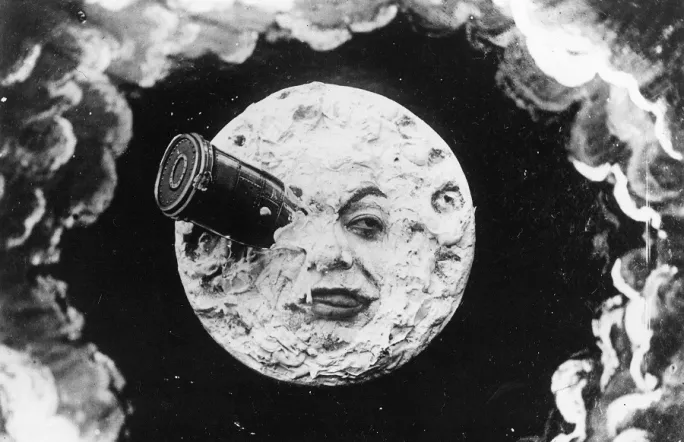How sci-fi films take students’ learning out of this world
The British Film Institute, Into Film and the Institute of Physics have put together a package of resources, events and initiatives to help both teachers and young people engage with science fiction films. Here, Paul Gerhardt, director of education at BFI, explains why.
A teacher friend of mine often tells me about the “Sunday evening” problem: you need to plan a new lesson but just don’t have the time to research and put together an exciting new approach that will wake up Class 10B. “What you need,” I suggest, “is something out of this world.”
Science fiction films could be the very thing.
The great thing about sci-fi, especially for learning, is that so many of its “futuristic” scenarios turn out to be (relatively speaking) just one small step away. Georges Méliès’ Trip to the Moon (pictured above) was made a mere 67 years before Neil Armstrong’s stroll on the lunar surface. The Day the Earth Caught Fire (1961) eerily anticipates today’s anxieties around global warming. And could 2001‘s Hal, the super-intelligent computer who rebels against his human creators, turn out to be all-too prescient?
The possibilities for using these films are endless and we think that science fiction can beam into some unexpected parts of the curriculum.
Of course, science is the most obvious partner. Imagination may not be traditionally thought of as part of the scientific method, but the best scientists acknowledge that it plays a key role in their discoveries. That’s why our partners in pushing the boundaries of the use and understanding of sci-fi films in education also include the Institute of Physics, the Association of Science Education, the Wellcome Trust and King’s College London Institute of Psychiatry.
Sci-fi films are certainly key to getting science teachers into the profession. Hundreds recently took part in an Into Film poll to discover their favourite sci-fi film. The winner, Ridley Scott’s futuristic, philosophical android thriller Blade Runner (1982), might seem a surprising choice 32 years after its release, but clearly some futures age well. It beat both Back to the Future (1985) and The Matrix (1999) - in joint second place - and 2001: A Space Odyssey (1968), which came in as fourth favourite.
What else are we doing to encourage the use of science fiction? Wellcome is helping us to create an immersive Village of the Damned experience, with more than 600 young people getting involved in five events across the UK that will bring together theatre, professional neuroscientists, creative science workshops and screenings of the classic 1960 film.
But it’s not just the science, technology, engineering and maths (Stem) subjects that will benefit. We have chosen a top 10 countdown of fantastic films especially to take younger audiences (and their teachers) to infinity and beyond. And to support the films, we have been working with a group of teachers to create a cosmic collection of resources and lesson ideas, exploring how science fiction can energise a range of subjects from English and music to RE. Find out more on our TES and Sci Fi in the Classroom pages.
Our partners at Into Film will also be showing selections from our 10 titles at the Into Film Festival (4-21 November), with free screenings of Attack The Block (15), Flash Gordon (PG) and Village of the Damned (12), among others. They have also created some fascinating resources to accompany these titles.
The sci-fi universe may seem to be geared more towards boys than girls. But, in fact, the themes that define science fiction - technological innovation, the search for intelligent life, our changing environment - are universal. Titles such as the award-winning Kenyan film Pumzi offer a chilling but believable dystopian vision of the future that brings today’s environmental issues into sharp focus. And science fiction has produced plenty of dynamic heroines as well as heroes. Today, sci-fi is just as likely to be watched, read or played by girls as boys.
I will leave the last word on the impact of sci-fi on the young to the actor Ralph Fiennes: “I remember seeing 2001 when I was quite young, maybe 8 or 9, and it made a huge impression on me. The atmosphere…has stayed in my head and it really got under my skin.”
Paul Gerhardt is director of Education at the BFI. The schools initiative is part of the BFI’s major season Sci-Fi: Days of Fear and Wonder
Keep reading for just £1 per month
You've reached your limit of free articles this month. Subscribe for £1 per month for three months and get:
- Unlimited access to all Tes magazine content
- Exclusive subscriber-only stories
- Award-winning email newsletters





